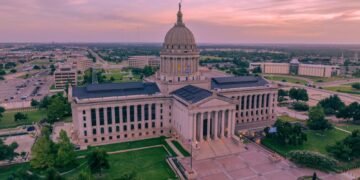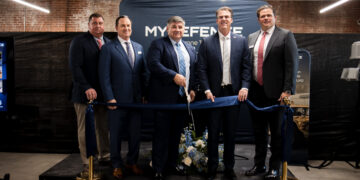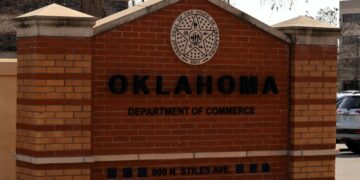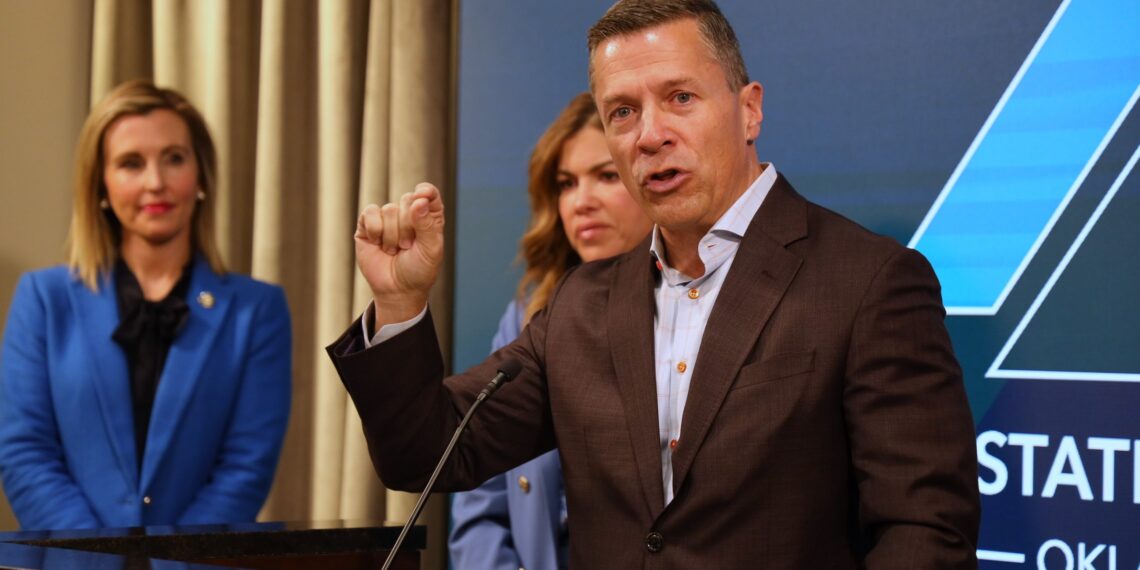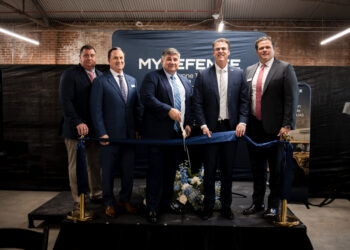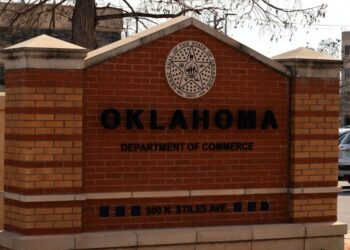OKLAHOMA CITY (OBV) – State Chamber of Oklahoma officials announced their agenda for the upcoming legislative session, giving their support to a range of bills that include economic development, income tax reform and growing the state’s workforce through childcare reform and new educational pathways.
State Chamber officials announced their legislative agenda during a news conference at the Oklahoma State Capitol on Thursday morning.
The Chamber, which advocates for businesses throughout Oklahoma, crafted the agenda to support business and economic development and workforce growth.
“Our job is to represent business, to embolden policies that help Oklahoma flourish and grow,” said Emily Crouch, State Chamber senior vice president of Government Affairs. “I’m excited about this year’s agenda because I think we’re going to move the needle in a number of areas.”
Several bills in the State Chamber’s 2024 legislative agenda are dedicated to growing the state’s workforce. Workforce development is a top priority for The State Chamber, which had success last year with the passing of Senate Bill 621. That bill established the Oklahoma Workforce Commission and was signed into law this past summer. The Workforce Commission is now having regular meetings to coordinate the state’s workforce efforts.
“We’re going to continue to focus on workforce transformation. We’re going to talk about pro-growth tax reform and we’re gonna talk about transforming economic development,” said Chad Warmington, president and CEO of The State Chamber. “Workforce remains a top concern for businesses in the state of Oklahoma. For three years running, it’s been at the top of the list. This year is no different. We are still short of people we need to have the kind of economy that we say we want to have.”
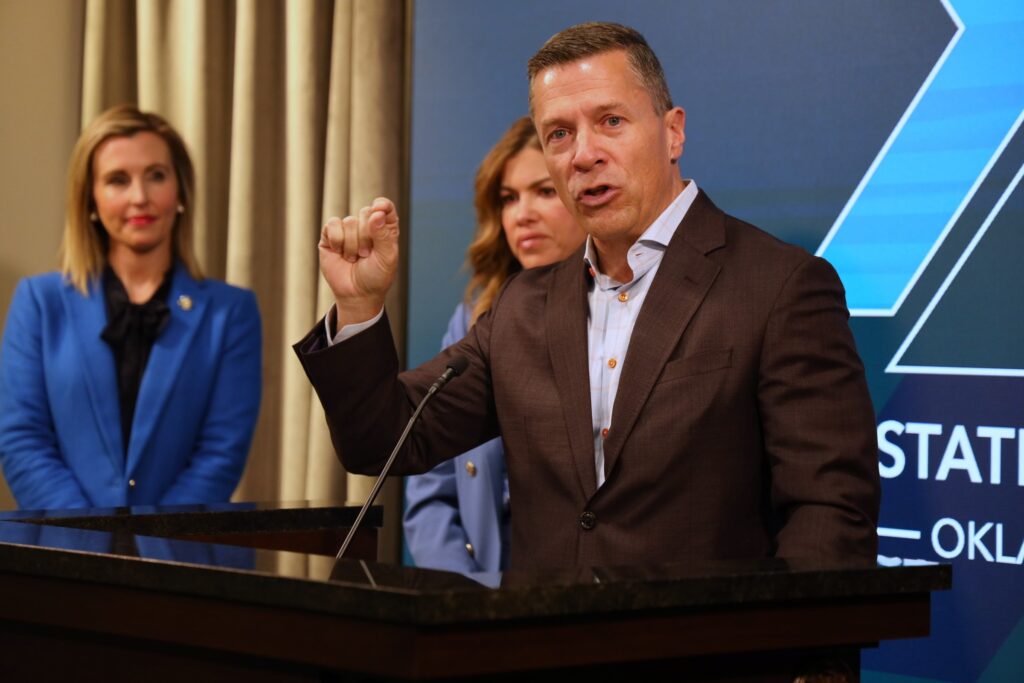
This year, the Chamber is supporting bills that seek to grow Oklahoma’s future workforce by aligning high school graduation requirements to career pathways.
”We’ve been having great conversations with K-12, CareerTech and higher education leaders about how Oklahoma can do a better job of getting students ready for their next chapter,” Warmington said. “How do we make it easier for a student to move within the system with purpose towards a career goal? When all those systems are aligned, it works best for all Oklahomans. It gives everybody an opportunity to get on a career pathway that’s going to put them in a job that’s going to change their family tree potentially. That’s what our workforce system should be all about.”
The Chamber is also supporting workforce growth through childcare reform and economic development through the creation of a new entity within the Oklahoma Department of Commerce.
The bills that the Chamber is championing this legislative session are as follows:
Creating Future Workforce Pathways
- HB 3274 by Rep. Rhonda Baker, R-Yukon. A bill that expands graduation requirements by adding optional career-readiness and armed services assessments for certain students.
- HB 3278 by Baker. A bill that creates the Graduation Act of 2024.
- SB 1358 by Sen. Adam Pugh, R-Edmond. A higher education bill that creates the Workforce Development Revolving Fund. It also directs the Oklahoma Workforce Commission to identify certain workforce needs.
Getting Oklahomans Working
- HB 4147 by Rep. Suzanne Schreiber, D-Tulsa. A bill that enacts the Childcare Reform Act of 2024.
- SB 1496 by Pugh. A bill that provides a tax credit for childcare businesses and allows unused credits to be carried forward; increasing credit for small businesses.
Investing in Oklahoma
- SB 1447 by Sen. Kristen Thompson, R-Edmond. A bill that creates the Creating Oklahoma’s Modern Plan for Economic Transformation and Effectiveness (COMPETE) Act and the Oklahoma Office of Economic Development, Growth and Expansion (OkEDGE).
- SB 1448 by Thompson. A bill that appropriates $698 million to OkEDGE.
- HB 3252 by Rep. Mike Osburn, R-Edmond. A bill related to the Oklahoma Department of Commerce that compliments the creation of OkEDGE.
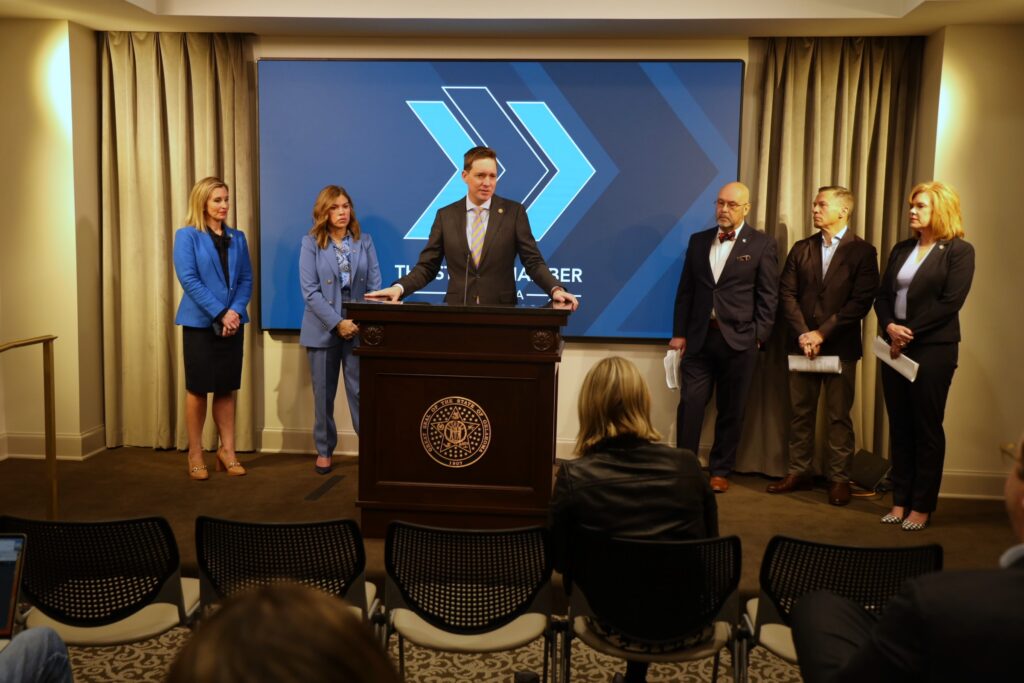
If passed into law, OkEDGE will be located in the Department of Commerce facility and comprised of Commerce employees. It will be solely dedicated to revolutionizing economic development and recruiting and retaining businesses in the state. The bill was written after major companies, including Panasonic, Tesla and Volkswagen, chose to not build factories in Oklahoma. It also seeks to dissuade major companies from leaving Oklahoma. Michelin representatives announced late last year that the company was closing down its factory in Adrmore, which employs around 1,400 Oklahomans.
Lt. Gov. Matt Pinnell championed the development of OkEDGE. He spoke during the news conference and introduced Thompson, the bill’s author.
“This is not legislation that we just put together over the last couple of weeks. It has been a nine/10-month process of talking to stakeholders across 77 counties, rural, urban, pulling in legislators from day one, not day five, not day 10, not two months into the process, but having the legislative bodies obviously there at the beginning of the process,” Thompson said during the news conference. “I think it has prepared us to be very successful this legislative session for getting this legislation across the finish line.”
OkEDGE will be laser-focused on recruitment of new businesses and highly supportive of existing Oklahoma companies to help them grow, Thompson said.
“We have learned over the last year of really in-depth conversations that our current structure is just not very effective. And so we are going to rework the way that Oklahoma does business. That way we can really move the needle on economic development,” Thompson said.
Thompson said OkEDGE will have a board of commissioners whose economic development efforts will coordinate with the Workforce Commission’s workforce development efforts.
“If we don’t have the workforce, we can’t grow our economy. With that said, there are provisions inside Senate Bill 1447 that actually require them to collaborate with the Workforce Commission. There’s all sorts of statutory requirements to encourage collaboration because I have learned that sometimes we don’t like to collaborate. And so we’re saying, ‘Hey, you have to,'” Thompson said.
Baker, a former teacher, spoke during the news conference about the impact her bills will have in creating new educational pathways that will build Oklahoma’s future workforce.
“We all recognize that in order to have proper economic development, workforce development, you have to have a strong educational system. The state of Oklahoma has done a remarkable job over the past seven years of investing in education. We have tried to figure out ‘what do we do behind the scenes?’ We’ve made these great investments. What are we missing? Well, there have been a lot of conversations up here,” Baker said. “Nothing that we are bringing to you today is something that we just thought about overnight and decided we’re running legislation. It has involved a lot of conversations over a great period of time.”
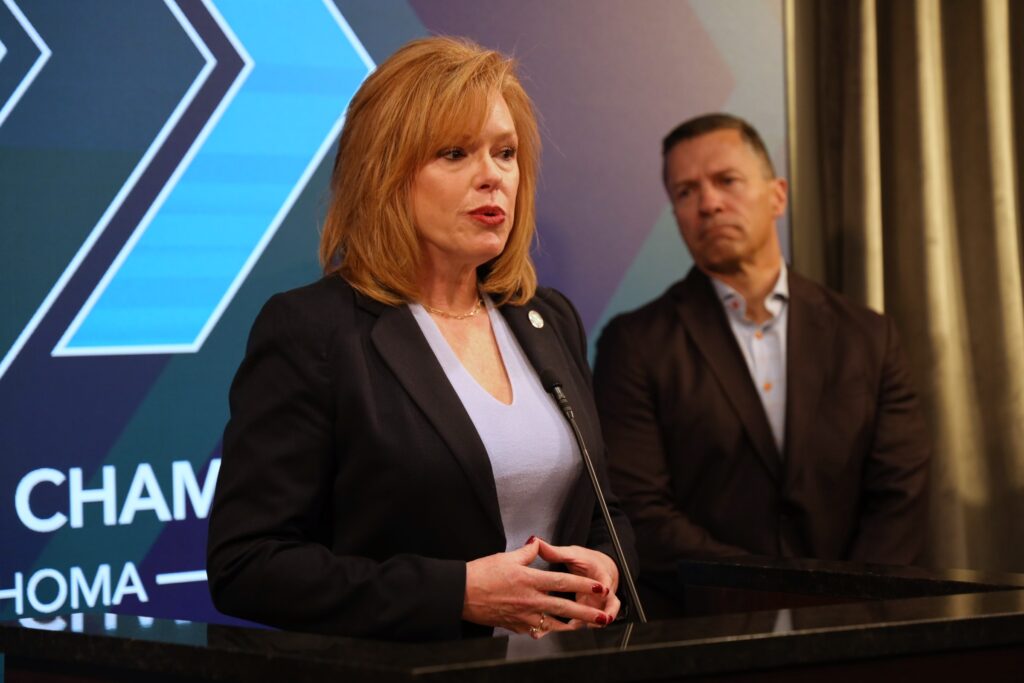
Those lengthy conversations resulted in House Bill 3278.
“The plan is that we have got to change the graduation requirements and call it a pathway. What are students doing today that is different than what students did when I was in school? So we all know students learn differently. We know that there are different challenges for them. We know that the careers that were a big deal and were great opportunities when I was growing up are often obsolete now for these students,” Baker said. “So we have to change the way that we are making school for these students, and we’ve got to make it relevant to what they plan to do in their lifetime. And so students now are taking this in schools and trying to implement this career plan. But what are we doing to really make that career choice relevant to them? And so we’ve had to go back and look at these graduation requirements. So we did an interim study on updating those graduation requirements, and it was a really exciting time.”
Expanding graduation requirements will enable students to participate in more classes that provide vocational and job training that will prepare them for their future careers, Baker said.
Schreiber said her childcare bill will help grow the state’s workforce. The rep from Tulsa is a champion of childcare reform. A bill she wrote last year that streamlines licensing regulations of childcare facilities was signed into law. Her legislation, which includes legislation that is carrying over from the last legislative session, is a continuation of her effort to get out-of-work parents back to work by making childcare more accessible and affordable in the state.
“Oklahoma has about a 62 percent labor force participation, and that’s behind the national average. We have a lot of people who are not participating [in the workforce] and we have a lot of parents who are not participating, which tells us that these parents want to work but they cannot find childcare or they can’t afford it,” Schreiber said. “So, House Bill 2451 takes a stab at figuring out how we can help those parents access this. And we can get them back into the workforce and our businesses can be functioning right when they need to be fully staffed so they can be operating at full tilt to build this economy that we want so that we can have representative Baker’s students when they become part of the workforce, that they can have the childcare that they need.”
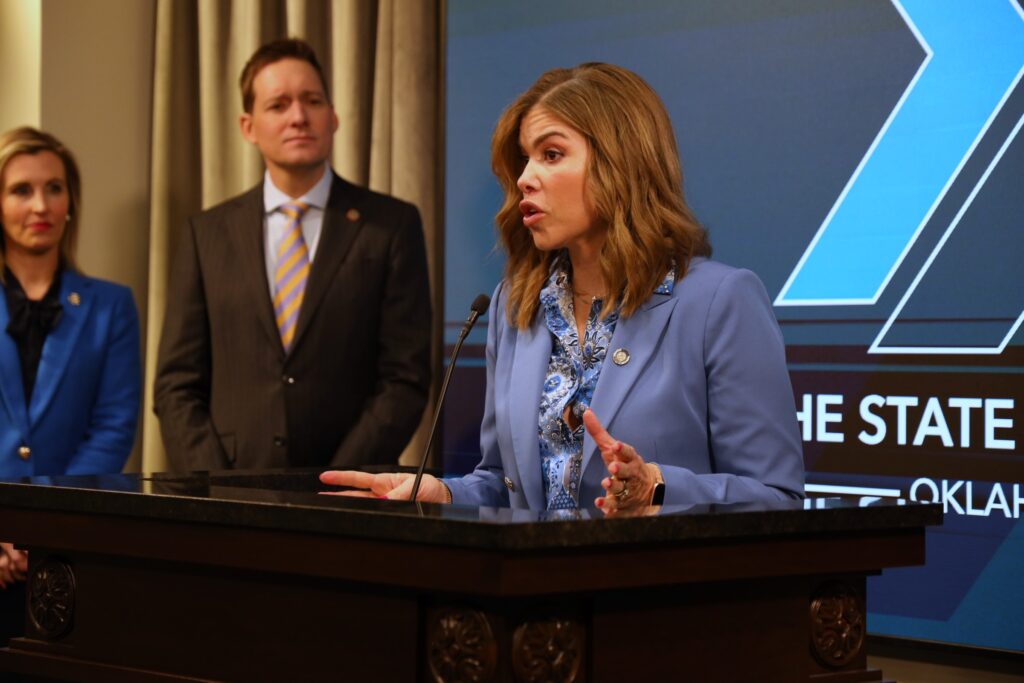
A thriving workforce does not exit without adequate childcare, Schreiber said.
“The tax credit bill that we have offers two tracks on the tax credit. One is for employers and it offers a $30,000 tax credit for employers who either participate in sharing the costs with their employee, who buy into a childcare and buy slots for their employees or who operate or contract to operate a childcare. And that is something that 21 other states do. I know Oklahoma is totally ready to do it,” she said. “We are all about the public private partnerships. As a state, we offer a tax credit, incentivize those employers to participate with their employees in the cost of childcare. And it really solves a lot of problems. And like I said in the beginning, the childcare world is a very complicated, complex world.”
Simplifying the personal income tax is also part of The State Chamber’s agenda. The Chamber supports House Bill 2285, which was filed last year by Rep. Mark Lepak. The bill seeks to consolidate Oklahoma’s individual income tax system’s six brackets into one flat rate, while increasing the standard deduction to $10,350 for individual filers – double for married joint filers – to eliminate increased tax liability. The bill also aims to cut the income tax rate for all Oklahomans to 4.5 percent and create a path for future rate reductions, only if revenue conditions are appropriate for additional cuts. That bill will carry over into the upcoming legislative session.
“Unless you collapse the brackets into one flat bracket and you expand the standard deduction, it’s not equitable when you make a tax cut,” Warmington said during the news conference.


